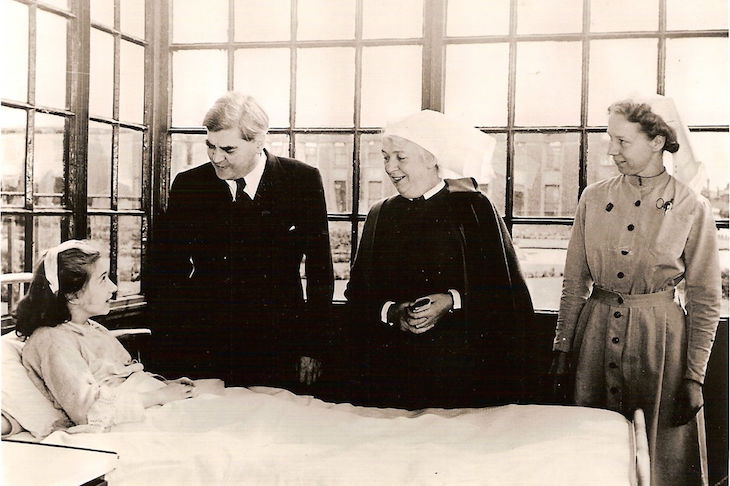When Nye Bevan launched the NHS on 5 July 1948, most of the British population could not expect to celebrate a 70th birthday. Life expectancy at birth for men was 66 and for women 71. That this has since grown to 79.1 years and 82.8 years respectively is in part — though far from entirely — thanks to the NHS.
Many insist that Bevan’s description of the service as the ‘envy of the world’ remains true. For Lord Lawson, a former editor of this magazine, the NHS is ‘the closest thing the English people have to a religion’ — an assertion confirmed during the opening ceremony of the London Olympics, when NHS nurses jumped joyfully up and down on old-fashioned hospital beds. Moreover, public affection for the NHS seems impervious to scandals such as Mid Staffs and, as revealed last week, a fatal policy of over-prescribing opioids at Gosport Memorial Hospital.
Yet the accolades awarded to the NHS are only half-deserved. The principle that underpinned its foundation — that healthcare should be available to everyone, equally, regardless of the means to pay — is rightly valued. No one wants to go back to the days when parents would avoid taking sick children to see a doctor for fear of being unable to pay the bill. But when it comes to the quality of care, the NHS does not fare so well. A joint report this week by the Health Foundation, the IFS, the King’s Fund and the Nuffield Trust puts it bluntly: ‘The UK appears to perform less well than similar countries on the overall rate at which people die when successful medical care could have saved their lives.’
While the NHS is good at managing some conditions such as diabetes, the UK’s mortality rate from cancer, heart disease and strokes compares very poorly with that of other developed countries.
An international comparison last year by the US healthcare charity the Commonwealth Fund says it all. The NHS came top out of 11 countries on measures of ‘equity’ and ‘care process’. It was third on ‘access’ and — a surprise to many, especially after the fiasco of the £10 billion abandoned NHS IT system — ‘administrative efficiency’. Yet when it came to ‘healthcare outcomes’ it slipped to second-bottom place. As a safety net for those who cannot afford cover, the NHS is second to none — which is why it comes to be used by so many health tourists who are not strictly entitled to its free care. But when it comes to saving your life, an NHS hospital would not be your first choice.
Some insist that the NHS’s shortcomings could be overcome simply by funding it better. It is true that, as a share of GDP, Britain spends a little less on healthcare than its neighbours — 9.7 per cent compared with 11.3 per cent in Germany and 11 per cent in France. The lower level of funding means British hospitals have fewer doctors, nurses, CT scanners and MRI machines per capita. Yet few really believe that the extra £20 billion a year which the government has promised the NHS by 2023 will end the perpetual sense of crisis or, on its own, raise cancer survival rates to those of other countries.
The problem the government has is that it has become politically difficult to enact reforms which involve anything other than the NHS remaining a state-run and state-owned monopoly. Every time anyone proposes an innovation involving the private sector, even in a limited capacity and one which would fully preserve the principle of healthcare being free at the point of delivery, it is killed off by the unions, who begin to wail about ‘creeping privatisation’. Opponents of reform have even managed to damn the concept of the ‘internal market’ — despite the fact that many users of the NHS appreciate the limited choice it has provided in how, when and where they have an operation or other procedure. The days when we were offered only a take-it-or-leave-it option at our local hospital are easily forgotten.
Out of political fear, the government has made its latest injection of cash dependent only on a handful of efficiency measures, needlessly limiting innovation through tapping a wider source of healthcare providers. Yet what surely matters to NHS patients is whether they can get the treatment they need when they need it, not whether every clinic is owned by the state and every hospital doctor in the government’s pay. There ought to be room for the NHS to learn from other health services, many of which make use of competing health providers.
No amount of money will ever be enough for a health service, especially one which many users have come to think of as a health insurance policy without limitations. As Theodore Dalrymple once observed in this magazine, if every NHS patient were to be offered every treatment which could possibly benefit them, all other economic activity would have to cease. Yet the NHS could and should be able to improve without vast increases in budget. Misplaced sentiment is keeping the NHS in the form it assumed in the 1940s. On its 70th birthday, it really deserves better.






Comments